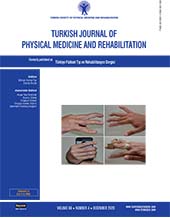Factors affecting activities of daily living, physical balance, and prosthesis adjustment in non-traumatic lower limb amputees
2 Department of Orthopeadics and Traumatology, Bakırköy Dr. Sadi Konuk Training and Research Hospital, Istanbul, Turkey
3 Department of Orthopeadics and Traumatology, Elazığ Training and Research Hospital, Elazığ, Turkey
4 Department of Orthopeadics and Traumatology, Ardahan State Hospital, Ardahan, Turkey DOI : 10.5606/tftrd.2020.4623 Objectives: This study aims to identify the factors affecting the activities of daily living, balance, and prosthesis satisfaction in patients with non-traumatic lower limb amputation (LLA).
Patients and methods: This cross-sectional study included a total of 195 patients (120 males, 75 females; mean age 65.9±11.6 years; range, 40 to 90 years) who underwent LLA between January 2009 and April 2017. All patients were evaluated in terms of age, sex, amputation etiology, side, level, comorbidity, length of hospital stay, prosthesis adjustment, ambulation level, functional outcome, and complications. Prosthesis adjustment, physical balance ability, and daily living activities were assessed using the Turkish versions of the Trinity Amputation and Prosthesis Experience Scales (TAPES), Berg Balance Scale (BBS), and Nottingham Extended Activities of Daily Living Scale (NEADLS), respectively.
Results: There was no significant difference between male and female patients in terms of prosthesis and amputation adaptation, physical balance, and activities of daily living. The BBS, TAPES, and NEADLS scores were lower in the patients aged over 65 years (p<0.001, p<0.001, and p<0.001, respectively). Prosthesis and amputation adaptation, physical balance, and daily living activities were also worse in this age group. Transfemoral amputees had lower BBS, TAPES, and NEADLS scores than the transtibial amputees (p=0.009, p=0.020, and p=0.004, respectively). Prosthesis and amputation adaptation, physical balance, and daily living activities were worse in the transfemoral amputees.
Conclusion: Age and amputation level affect physical balance, prosthesis satisfaction, and daily living activities after non-traumatic LLA. Therefore, orthopedic surgeons and physical therapists should conduct a multidisciplinary evaluation, particularly in patients aged over 65 years and in transfemoral amputees to improve outcomes.
Keywords : Activities of daily living, amputation adaptation, lower limb amputation, physical balance, prosthesis satisfaction
















